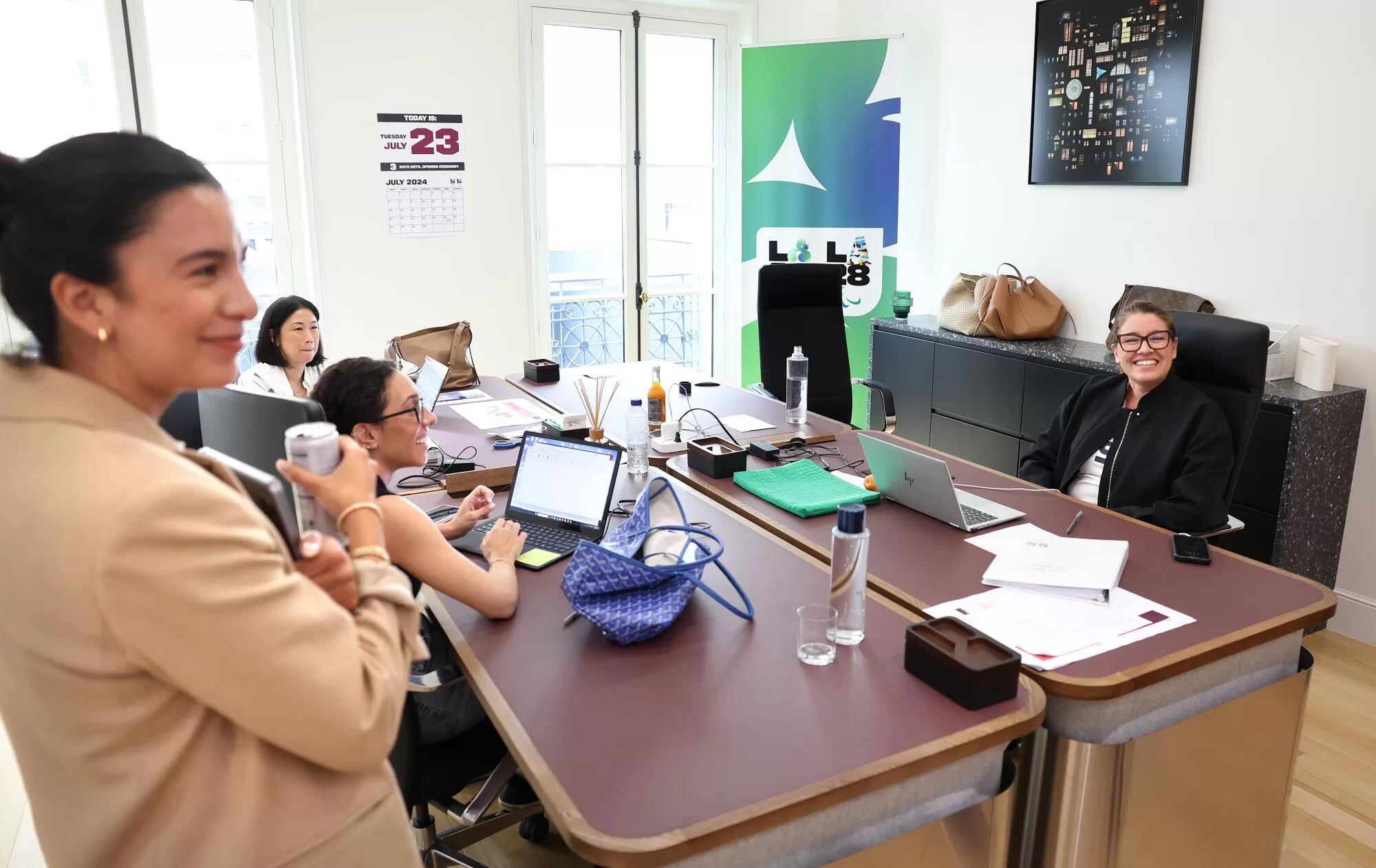Sitting on a brightly lit stage, facing a darkened hall full of unfamiliar faces, Reynold Hoover mostly kept his mouth shut.
As the new chief executive for LA28 — the private group in charge of the 2028 Los Angeles Games — Hoover was summoned to a meeting of the International Olympic Committee on Tuesday. But, as a long-time military officer with little experience in sports, he stuck to a mantra.
“Look, listen and learn,” he said.
The same could apply to the rest of the LA28 contingent that has arrived for the upcoming Paris Olympics and Paralympics.
Hoover and his staff have established an office on Rue de la Paix in the 2nd arrondissement, a neighborhood known for its upscale jewelers and boutiques. During the next two months, they will endlessly quiz French organizers and peek behind the scenes for clues on how the Games should — and should not — be run.
LA28 workers organize before an Olympics presentation in Paris on Tuesday.
(Wally Skalij / Los Angeles Times)
“There’s no manual about how to do it,” Hoover said. “So it really is a lot of looking at what was done in the past and adapting.”
This learning process begins with a man who, at 63, has embarked on an unexpected career change.
A West Point graduate, Hoover rose to the rank of three-star lieutenant general in the U.S. Army and National Guard. He was chief of staff for FEMA in the early 2000s and, later, a special assistant to President George W. Bush. He also oversaw logistics for the American military during the war in Afghanistan.
The latter experience helps explain why, years after his retirement in 2018, he was recruited for a four-year stretch — beginning at the end of the Paris Games — in which LA28 must deliver on the promises and plans it has made during the last seven years.
In Central Asia, his role focused on establishing forward operating bases for a surge of 30,000 troops.
LA28 chief executive Reynold Hoover
(Wally Skalij / Los Angeles Times)
“We flew them in and moved them into billets,” he says. “We provided medical services, we provided mail service, we provided food and water.”
Of his new job, he says, “There are so many parallels.”
Such as inviting Olympic delegations from more than 200 countries around the world. Housing them in an athletes village at UCLA. Ferrying them around Southern California for competitions at dozens of stadiums and arenas.
At this point, a vital part of any organizing committee’s preparation involves the IOC “observer program.” The next city in line gets to send its people to study every part of the Olympic operation.
By the end of the Paralympics on Sept. 8, LA28 will have brought about 70% of its 151 employees through Paris. Staff members involved with ticketing, venue management and other specialties will have observed their relevant counterparts at work.
As LA28 chairman Casey Wasserman told the IOC session Tuesday, “We’re just glad they’re going first.”
A calendar taped to the wall of the organizing committee’s temporary office shows color-coded appointments stretching weeks in advance. There are meetings each morning to review plans. After every guided tour, staff enters digital notes that artificial intelligence software transforms into summaries for others to review.
Only a few days into this process, Hoover has been surprised by the work required to operate something as deceivingly simple as a skating venue.
Former Lakers player Pau Gasol speaks during an LA28 and IOC meeting and presentation in Paris on Tuesday.
(Wally Skalij / Los Angeles Times)
The structure itself is compact and hosts a relatively small number of events, but the number of employees from Paris 2024, the IOC and the international skateboarding federation needed for planning and operations is substantial.
“To come off without a hitch?” he said. “That was eye-opening.”
Lessons learned here could help LA28 and its new day-to-day leader navigate difficulties that will inevitably arise in the four years leading to a opening ceremony at the Coliseum and SoFi Stadium on July 14, 2028.
Some parts of the current Games plan will almost certainly be ditched for practical reasons. Budget might also come into play.
Organizers have promised that corporate sponsorships, ticket sales and other revenue sources will pay all costs, which are currently estimated at $7 billion but could rise. If they come up short, the city and state have agreed to make up the difference with taxpayer dollars.
“Casey Wasserman and I think about it every day,” Hoover said. “We acknowledge it and it is part of the calculus as we make decisions and move forward.”
Some of those decisions might upset the IOC, the international sports federations, the athletes or even fans. Hoover insists he is prepared to take the heat.
But at the IOC session in Paris on Tuesday, he chose to remain in the background, letting Wasserman handle the bulk of the presentation to members. IOC president Thomas Bach joked afterward about one of the steepest learning curves for newcomers to the Olympic movement — all the shorthand used for various organizations and committees.
NOC. NGB. OCOG. ASOIF.
Hoover hit the button on his microphone.
“Mr. President,” he said, ”the Army is pretty good with acronyms.”
